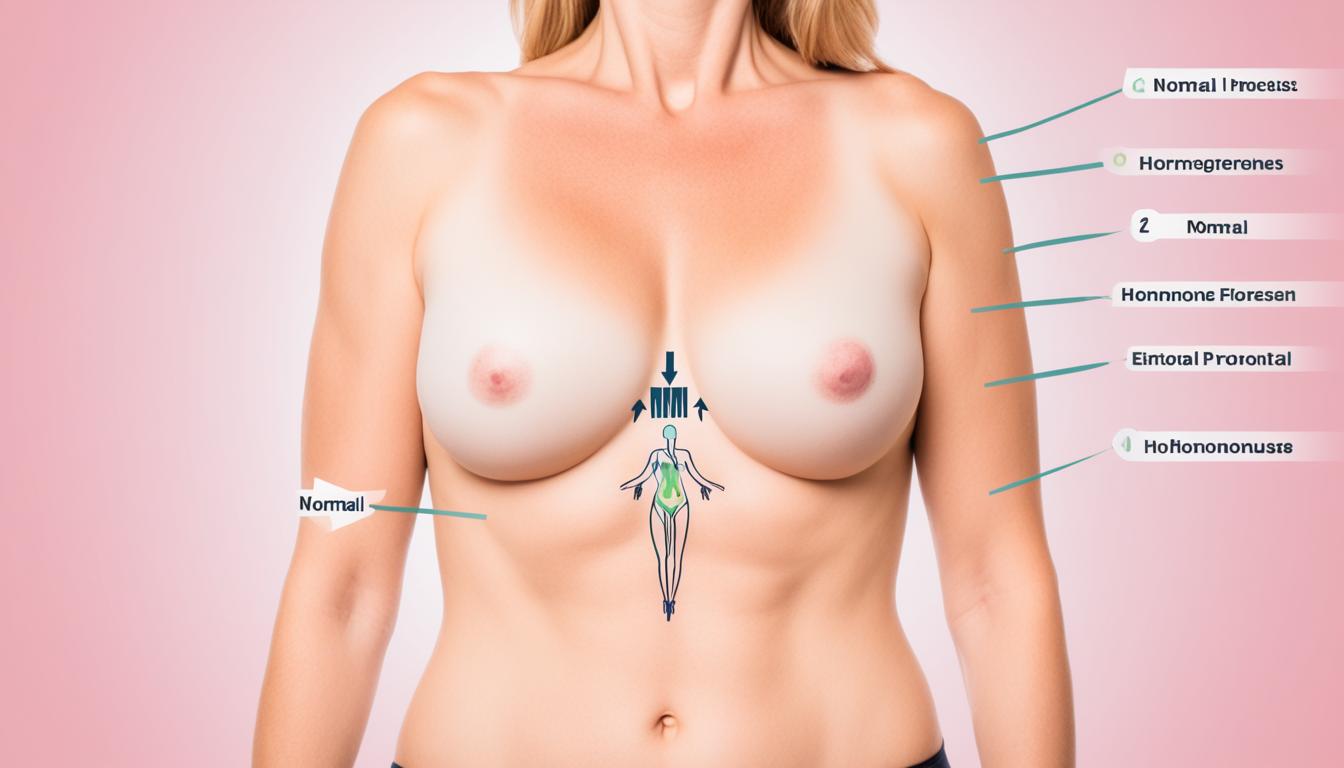Being a woman, I’m fascinated by how hormones and breast sizes are closely linked. I’ve seen the big effects hormonal changes can make on my body. Puberty, the years I could have children, and even menopause all show me how important hormones are in shaping us.
This guide explains in detail how hormones affect breast size. We’ll look at estrogen, which is key for breast growth, and other hormones like progesterone. We’ll see how they work together to affect the size and development of boobs at different life stages. Plus, we’ll find out what can make each person’s breast size unique.
Whether you’re hitting puberty, thinking about birth control, or looking ahead to menopause, this guide is here to help. It will help you understand how your breasts and hormones are connected. So, let’s start this journey together. We’ll answer the question: How do hormones change breast size?
Key Takeaways
- Estrogen is the main force behind breast growth. It causes breast tissue to develop during puberty.
- Progesterone, prolactin, and growth hormones also play a role in breast size, changing throughout a woman’s life.
- Issues with hormone levels can cause big swings in breast size, making them bigger or smaller.
- Age, genes, and how you live your life can also affect breast size.
- Knowing about how hormones and breast size are linked is key for managing any health issues related to the breasts.
Introduction to Hormones and Breast Development
Hormones, especially estrogen and progesterone, control breast development and size. Estrogen is crucial for breast growth. It triggers the growth of breast tissue and deposits fat during puberty. Progesterone helps breast tissue mature further.
Estrogen: The Primary Driver of Breast Growth
Estrogen mainly grows and develops breast tissue. The big surge in estrogen at puberty helps grow the mammary glands and deposits fat. This leads to the change in breast shape in young women.
Role of Progesterone and Other Hormones
Besides estrogen, hormones like prolactin and growth hormones also impact breast size. Progesterone helps in the ongoing development of breast tissue, affecting their size and makeup.
This part gives an outline of key hormones in breast growth and their roles. It’s crucial for understanding and dealing with various breast health concerns and conditions that alter breast features.
Hormones and Breast Size During Puberty
During puberty, your breasts start to grow thanks to a hormone called estrogen. Estrogen makes your breast tissue, glands, and fat grow. So, as you go through puberty, your breasts will change a lot because of these hormones.
Estrogen Surges and Breast Development Stages
As you start puberty, your body makes a lot more estrogen. You’ll see your breasts begin to grow and change. They’ll keep changing in size and shape as your estrogen levels go up and down. It’s interesting to learn how hormones and breast size are connected during this time.
Factors Influencing Individual Breast Size
Puberty hormones are the main reason for breast growth. But, other things like genetics and overall health also matter. This means your breast size is also affected by things you inherit and your body’s condition. So, breasts can vary in size from person to person. It’s all part of understanding how unique our bodies are during puberty.
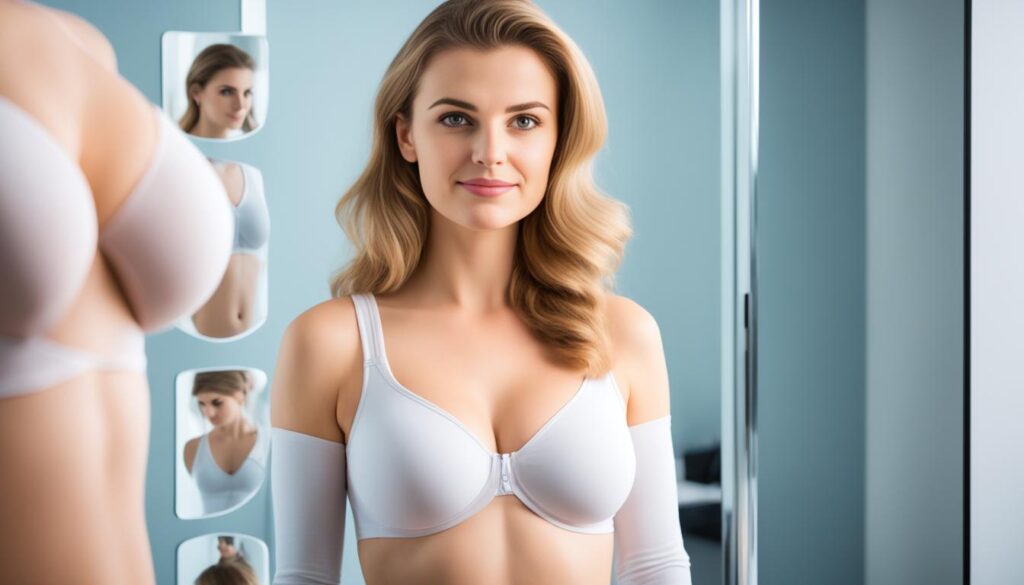
How do hormones affect breast size?
Hormones are key in deciding how big a woman’s breasts grow over time. Changes in hormone levels can make breasts bigger or smaller. For instance, conditions like hypothyroidism or PCOS can boost breast size.
Hormone Imbalances and Breast Size Changes
On the flip side, women might see their breasts get smaller during menopause due to low estrogen. It’s important to know how hormone issues can affect breasts. This knowledge is key to knowing more about breast development.
Estrogen Levels and Breast Density
Estrogen also affects how dense breasts are. Higher estrogen levels often mean denser breasts. Understanding this link is important for breast health and dealing with related conditions.
Hormonal Contraceptives and Breast Size
Using hormonal contraceptives like birth control pills can change breast size. These pills, with synthetic estrogen and progestin, can adjust breast size and density. Some may see their breasts grow at first on the pills. But, others might have their size decrease after a while.
The Effect of Birth Control Pills
A 2014 review showed that birth control pills with both estrogen and progestin don’t really make you gain weight. But, those with only progestin might have less significant side effects, like affecting breast growth. Before you start or switch your birth control, talk to your doctor about potential side effects.
Thinking about using birth control pills? Consider these risks: being overweight or obese, smoking, 35 years or older, migraines with auras, high blood pressure history, clotting disorders, or high cholesterol. Also, know you might experience mood changes, different periods, breast tenderness, nausea, and headaches.
Other Hormonal Contraceptive Methods
Other methods, such as implants, injections, and patches, can also impact breast size. It’s important to know how each contraceptive affects breast development. This info is key for those thinking about or already using these methods.
Being aware of these changes can help you have a better discussion with your doctor. This is before you start any hormonal birth control. Stay knowledgeable about how these contraceptives might change your breasts. This way, you can wisely care for your health and handle any changes smoothly.

Pregnancy and Breastfeeding: Hormonal Changes
The journey of pregnancy and breastfeeding brings big hormonal changes. These changes can really change a woman’s breasts. This is all to get ready for taking care of a new life.
Breast Changes During Pregnancy
While pregnant, estrogen, progesterone, and prolactin rise high. They make breast tissue grow, increasing breast size throughout pregnancy. These changes help get the breasts ready for making milk and also lead to visible changes like a darker areola and larger breasts.
Hormonal Influences on Milk Production
After giving birth, hormones like prolactin go up even more. This helps you make and release breastmilk. This is key for the health of both mom and baby. But, being overweight or obese before pregnancy can lower how well you respond to prolactin, affecting milk production.
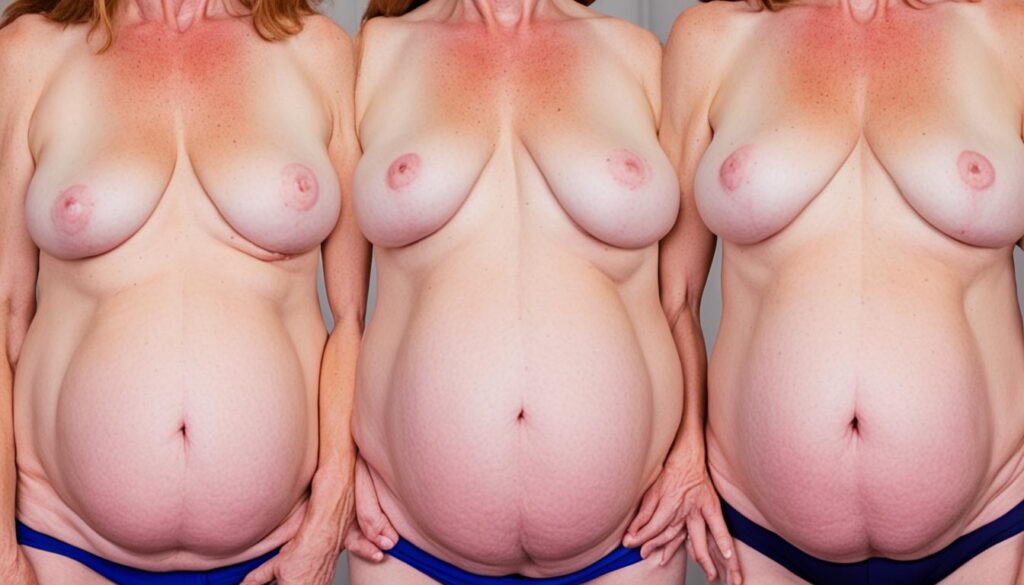
Understanding the hormonal effects on pregnancy and breastfeeding improves care for moms and babies. Knowing how important hormones are can help support women as they go through these life-changing processes.
Menopause and Hormone Replacement Therapy
When a woman reaches menopause, changes in hormones can affect her breasts. With lower estrogen, breasts might be less dense and sag more. This can make breasts appear smaller. Many women find this breast size changes during menopause troubling.
Breast Size Changes After Menopause
Estrogen decreases at menopause, leading to less dense, droopier breasts. Estrogen helps keep breast tissue firm. So, as it decreases, breasts lose some firmness. This often means breasts might seem smaller and sag more.
HRT and Breast Health Considerations
Some women choose hormone replacement therapy (HRT) to lessen menopausal symptoms. HRT can help keep breast tissue dense and prevent sagging. However, it has its downsides, including a possible increased risk of breast cancer. The impact of hormone replacement therapy on breast health must be carefully thought about.
It’s key for women to grasp how menopause, HRT, and breast health are linked. Talking to a doctor is the best way to figure out how to deal with breast size changes. They can also suggest ways to keep overall breast health in check during menopause.
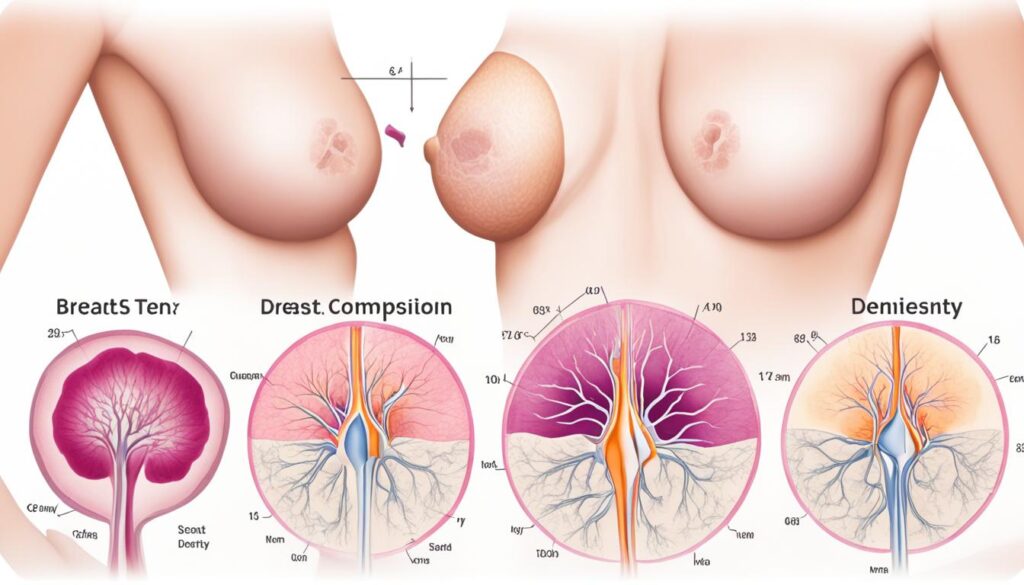
Hormones and Breast Cancer Risk
The link between hormones and breast cancer is complex. Estrogen, for example, is key in breast cancer’s start and growth. Too much estrogen, like from early periods or menopause after 55, can raise cancer risk. So, knowing how hormones affect breast health matters a lot.
Estrogen and Breast Cancer Development
Estrogen is vital for breast growth and might up the cancer risk. Too much estrogen for too long can make breast cells grow more. This boosts the chance of cancer-causing genetic changes. So, controlling estrogen levels is important in fighting breast cancer.
Hormone Therapy and Breast Cancer Prevention
Using hormone therapy to ease menopause symptoms might also up breast cancer risk. The choice to use hormone therapy involves weighing its benefits against this risk. It’s important for doctors and patients to craft treatment plans that focus on preventing cancer while supporting health.
Knowing how hormones link to breast cancer helps in both prevention and treatment. Being aware of this connection lets people take steps for their health. This includes making smart healthcare choices and actions to keep their breasts healthy.
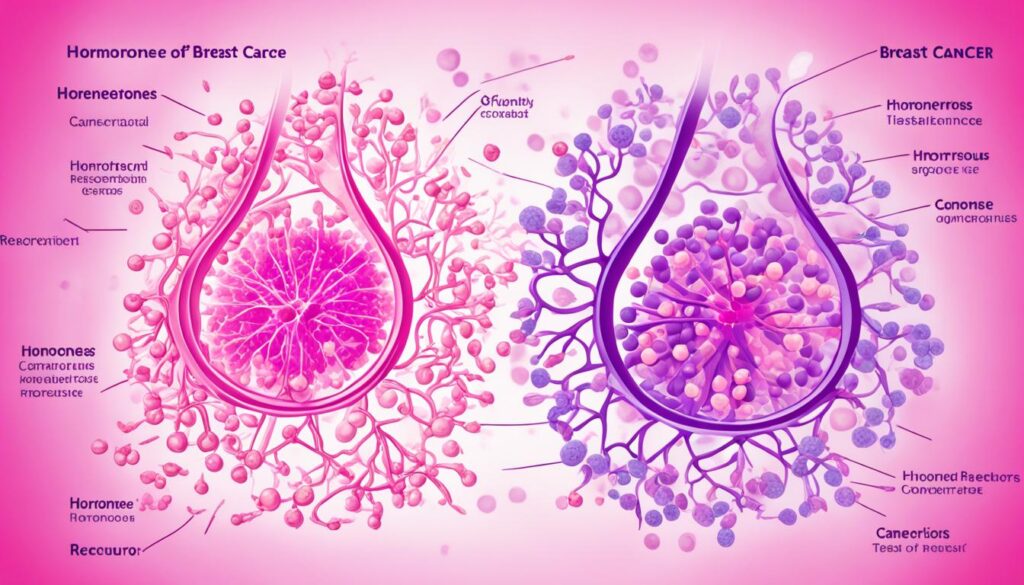
Transgender Hormone Therapy and Breast Changes
Transgender healthcare shines a light on how hormone therapy impacts physical changes. This includes breast development. As transgender people transition, hormones play a big role in their breast size and shape.
Feminizing Hormone Therapy and Breast Growth
Transgender women and those assigned male at birth often take feminizing hormone therapy. This includes estrogen and anti-androgen pills. These can help their breasts grow like during female puberty. This means more breast tissue and fat, making their chests look more feminine. Many see their breast size increase and their chest look more feminine.
Masculinizing Hormone Therapy and Breast Tissue
Transgender men and those assigned female at birth might take masculinizing hormone therapy. This usually includes testosterone. It can shrink breast tissue, making their chest look more masculine. Research backs how this therapy changes breast tissue.
It’s key for healthcare providers to know how different hormones affect breasts. Being informed and understanding is vital to support transgender people. This helps their transition process and ensures their well-being.
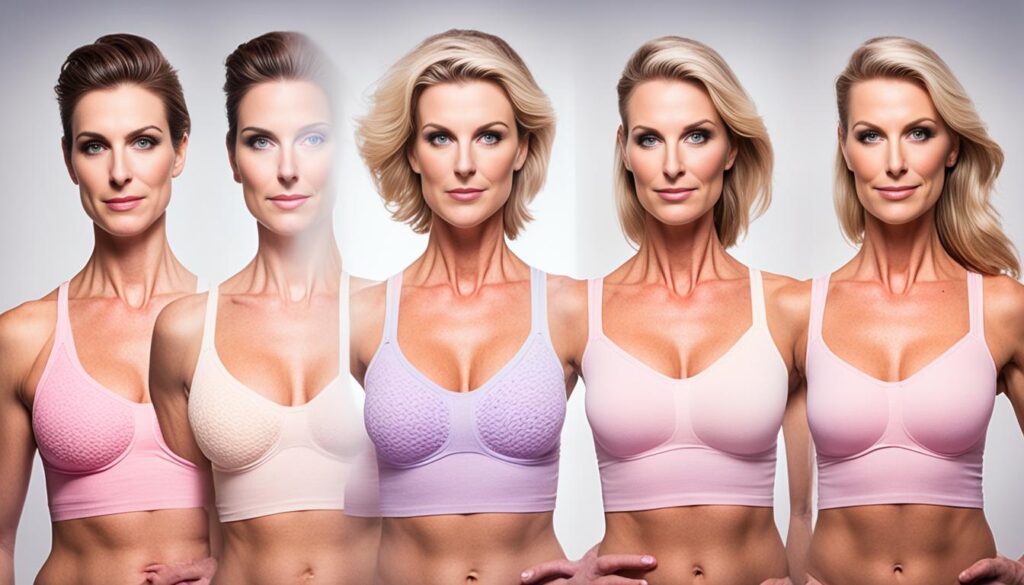
Other Hormonal Influences on Breast Size
Estrogen and progesterone aren’t the only hormones affecting breast size. Prolactin and growth hormones significantly contribute too. Prolactin comes from the pituitary gland. It’s crucial for breast tissue development and maintenance, mainly during pregnancy and when nursing. Prolactin boosts the growth of mammary glands and helps with milk production, playing a big part in developing breasts.
Prolactin and Breast Development
Prolactin greatly influences the size of breasts. It helps grow and change breast tissue. When a woman is pregnant or after having a baby, prolactin levels spike. This makes the mammary glands expand and produce milk. For many, this means their breasts get bigger. In some cases, issues like prolactinomas, which are pituitary tumors, can cause unusually large breast sizes.
Growth Hormones and Breast Tissue
Growth hormones from the pituitary gland also shape and grow breast tissue. They control how fat is distributed in the breasts. For those with more growth hormones, their breast size might increase. But, not having enough can lead to different breast sizes and shapes.
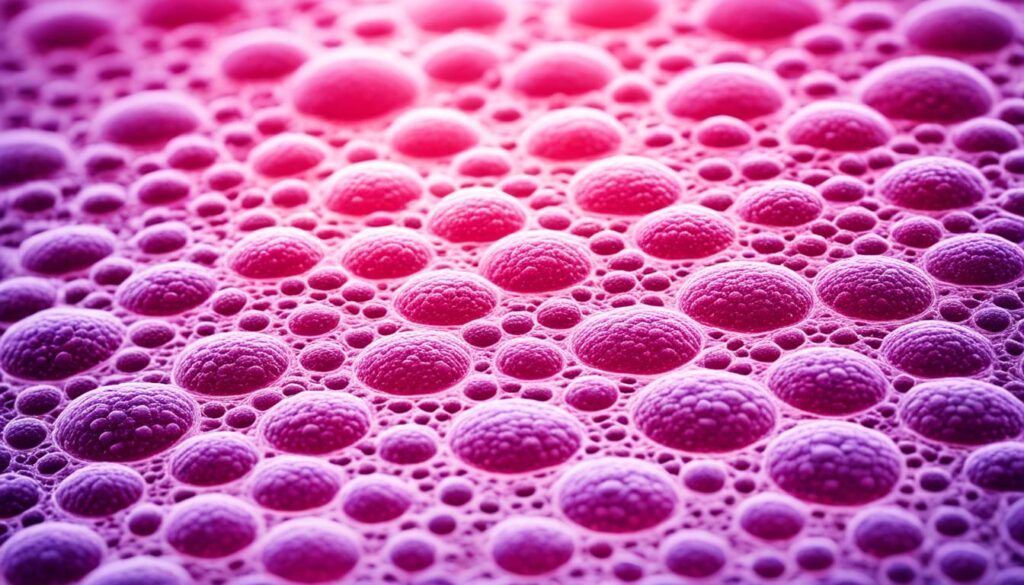
Knowing about the wide range of hormones that affect breast features is important. Understanding prolactin and growth hormones helps experts and individuals deal with breast size issues. This knowledge is key for tackling breast concerns effectively.
Conclusion
Hormones are key in deciding breast size. Estrogen drives breast growth, crucial in puberty. Other hormones like progesterone, prolactin, and growth hormones also play a part.
Hormone imbalances can change breast size. This might happen with contraceptives, pregnancy, breastfeeding, or menopause. Knowing how hormones and breasts work together helps in managing health issues.
This guide has made me understand female physiology better. Now, I know more about hormones and breast changes. I’m thankful for all the new knowledge.
